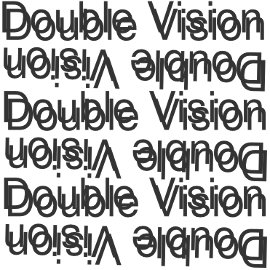Diplopia (double Vision)
Double vision can be a symptom of many different visual conditions that affect children and adults, such as strabismus (eye turns: exotropia, esotropia, hypertropia), convergence insufficiency or visual conditions related to head injuries.
If the two eyes are misaligned and aim at different targets, two non-matching images will be sent to the viewer's brain. When the brain accepts and uses two non-matching images at the same time, double vision results.

Double vision is dangerous to survival, so, the brain naturally guards against its occurrence. In an attempt to avoid double vision, the brain will eventually disregard one of the mismatching images. That is, the brain will ignore one eye (called suppression).
Due to the brain's ability to suppress one eye, a person's double vision can appear to go away without medical evaluation or treatment. Bear in mind that the causes of the double vision are very likely still present and that loss of vision in one eye has probably occurred due to lack of treatment. When vision in one eye is lost, the person has also lost normal depth perception and stereo vision. However, the loss of vision could be temporary and treatable.
Double vision is not a minor complaint! When double vision occurs, seek a complete visual evaluation from a specialist in binocular (two-eyed) vision.
Causes of Double Vision (Diplopia)?
There are two possible and different causes:
- The most common cause of double vision is misalignment of the two eyes due to functional problems in the visual system. This web page contains complete information on this type of double vision: binocular diplopia.
- A structural defect in the eye's optical system is a much less common cause of double vision. Cataracts, for example, might cause such a defect. In this case, diplopia can appear in only one eye; this is called monocular diplopia.
Double vision can be a symptom of many different visual conditions that affect children and adults, such as strabismus (eye turns: exotropia, esotropia, hypertropia), convergence insufficiency or visual conditions related to head injuries.
Education Navigation
- Monday: 9:00AM - 6:00PM
- Tuesday: 9:00AM - 6:00PM
- Wednesday: 9:00AM - 6:00PM
- Thursday: 9:00AM - 6:00PM
- Friday: 9:00AM - 2:00PM
- Saturday: CLOSED
- Sunday: CLOSED
